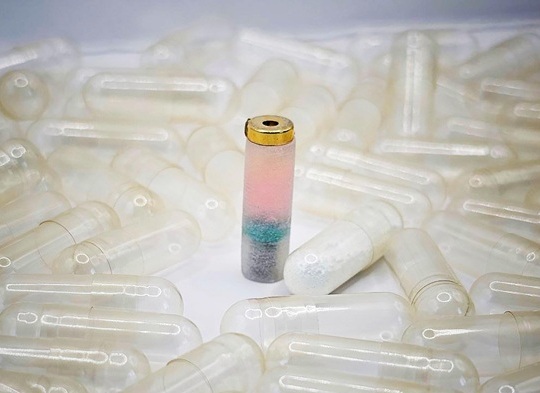Same Day DNA Sequencing-Based Test Identifies Secondary Infections in COVID-19 Patients
|
By HospiMedica International staff writers Posted on 23 Nov 2021 |

A same-day test has been shown to successfully identify secondary infections in COVID-19 patients in the intensive care unit (ICU) within hours rather than days.
The DNA sequencing-based test developed by researchers at Guy’s and St Thomas’ (London, UK) was evaluated by doctors in the ICU at St Thomas’ Hospital with 34 ICU patients during the first COVID-19 pandemic wave. The study showed how this rapid test will ensure patients get the right antibiotic faster, while also minimizing unnecessary antibiotic prescriptions to reduce the risk of antimicrobial resistance. The tests were evaluated for COVID-19 patients and shown to identify both bacterial and fungal infections and identify outbreaks with resistant bacteria within 24 hours. This is particularly important for COVID-19 patients who are highly susceptible to secondary infection and outbreaks.
When critically ill patients are cared for in the ICU, doctors take deep samples from their lungs. Currently, these samples are often sent to multiple labs where different bacterial and fungal cultures are set up alongside other complex molecular tests. Initial results take two to four days to return. During this time the patient often remains on standard antibiotic treatment, some of which may be unnecessary. In other patients, the treatment may be ineffective, as the bacteria has resistance genes to the standard antibiotics. The new same-day service uses cutting edge Nanopore sequencing technology to identify all bacterial and fungal pathogens present in patients’ samples, as well as any resistance genes present. The advance means that unnecessary treatment can be reduced, and patients can benefit from starting the right treatment sooner. The following day, the same test provides enough genetic sequence to compare pathogen genomes with a database that accurately identifies patients carrying the same strain so outbreaks can be detected at the very start. This is the first time this combined benefit of a single test has been demonstrated.
“As soon as the pandemic started, our scientists realized there would be a benefit to sequencing genomes of all bacteria and fungi causing infection in COVID-19 patients while on ICU,” said Professor Jonathan Edgeworth, Director of the Centre for Clinical Infection and Diagnostics Research (CIDR) and Medical Director of Viapath, who led the research. “Within a few weeks we showed it can diagnose secondary infection, target antibiotic treatment and detect outbreaks much earlier than current technologies – all from a single sample. This will revolutionize our approach to prevention and treatment of serious infection on ICU and we now plan to offer it as a clinical service for COVID-19 and influenza patients this coming winter.”
Related Links:
Guy’s and St Thomas’
Latest COVID-19 News
- Low-Cost System Detects SARS-CoV-2 Virus in Hospital Air Using High-Tech Bubbles
- World's First Inhalable COVID-19 Vaccine Approved in China
- COVID-19 Vaccine Patch Fights SARS-CoV-2 Variants Better than Needles
- Blood Viscosity Testing Can Predict Risk of Death in Hospitalized COVID-19 Patients
- ‘Covid Computer’ Uses AI to Detect COVID-19 from Chest CT Scans
- MRI Lung-Imaging Technique Shows Cause of Long-COVID Symptoms
- Chest CT Scans of COVID-19 Patients Could Help Distinguish Between SARS-CoV-2 Variants
- Specialized MRI Detects Lung Abnormalities in Non-Hospitalized Long COVID Patients
- AI Algorithm Identifies Hospitalized Patients at Highest Risk of Dying From COVID-19
- Sweat Sensor Detects Key Biomarkers That Provide Early Warning of COVID-19 and Flu
- Study Assesses Impact of COVID-19 on Ventilation/Perfusion Scintigraphy
- CT Imaging Study Finds Vaccination Reduces Risk of COVID-19 Associated Pulmonary Embolism
- Third Day in Hospital a ‘Tipping Point’ in Severity of COVID-19 Pneumonia
- Longer Interval Between COVID-19 Vaccines Generates Up to Nine Times as Many Antibodies
- AI Model for Monitoring COVID-19 Predicts Mortality Within First 30 Days of Admission
- AI Predicts COVID Prognosis at Near-Expert Level Based Off CT Scans
Channels
Critical Care
view channel
AI Heart Attack Risk Assessment Tool Outperforms Existing Methods
For decades, doctors have relied on standardized scoring systems to assess patients with the most common type of heart attack—non-ST-elevation acute coronary syndrome (NSTE-ACS). The GRACE score, used... Read more
'Universal' Kidney to Match Any Blood Type
Blood-type incompatibility has long been one of the greatest obstacles in organ transplantation, forcing thousands of patients—particularly those with type O blood—to wait years longer for compatible donors.... Read moreSurgical Techniques
view channel
Minimally Invasive Endoscopic Surgery Improves Severe Stroke Outcomes
Intracerebral hemorrhage, a type of stroke caused by bleeding deep within the brain, remains one of the most challenging neurological emergencies to treat. Accounting for about 15% of all strokes, it carries... Read more
Novel Glue Prevents Complications After Breast Cancer Surgery
Seroma and prolonged lymphorrhea are among the most common complications following axillary lymphadenectomy in breast cancer patients. These postoperative issues can delay recovery and postpone the start... Read morePatient Care
view channel
Revolutionary Automatic IV-Line Flushing Device to Enhance Infusion Care
More than 80% of in-hospital patients receive intravenous (IV) therapy. Every dose of IV medicine delivered in a small volume (<250 mL) infusion bag should be followed by subsequent flushing to ensure... Read more
VR Training Tool Combats Contamination of Portable Medical Equipment
Healthcare-associated infections (HAIs) impact one in every 31 patients, cause nearly 100,000 deaths each year, and cost USD 28.4 billion in direct medical expenses. Notably, up to 75% of these infections... Read more
Portable Biosensor Platform to Reduce Hospital-Acquired Infections
Approximately 4 million patients in the European Union acquire healthcare-associated infections (HAIs) or nosocomial infections each year, with around 37,000 deaths directly resulting from these infections,... Read moreFirst-Of-Its-Kind Portable Germicidal Light Technology Disinfects High-Touch Clinical Surfaces in Seconds
Reducing healthcare-acquired infections (HAIs) remains a pressing issue within global healthcare systems. In the United States alone, 1.7 million patients contract HAIs annually, leading to approximately... Read moreHealth IT
view channel
Printable Molecule-Selective Nanoparticles Enable Mass Production of Wearable Biosensors
The future of medicine is likely to focus on the personalization of healthcare—understanding exactly what an individual requires and delivering the appropriate combination of nutrients, metabolites, and... Read moreBusiness
view channel
Philips and Masimo Partner to Advance Patient Monitoring Measurement Technologies
Royal Philips (Amsterdam, Netherlands) and Masimo (Irvine, California, USA) have renewed their multi-year strategic collaboration, combining Philips’ expertise in patient monitoring with Masimo’s noninvasive... Read more
B. Braun Acquires Digital Microsurgery Company True Digital Surgery
The high-end microsurgery market in neurosurgery, spine, and ENT is undergoing a significant transformation. Traditional analog microscopes are giving way to digital exoscopes, which provide improved visualization,... Read more
CMEF 2025 to Promote Holistic and High-Quality Development of Medical and Health Industry
The 92nd China International Medical Equipment Fair (CMEF 2025) Autumn Exhibition is scheduled to be held from September 26 to 29 at the China Import and Export Fair Complex (Canton Fair Complex) in Guangzhou.... Read more

















